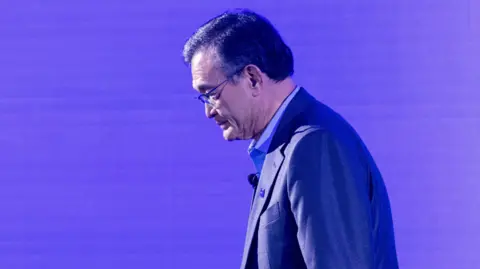 Getty
GettyPresident Donald Trump has called on the head of US chipmaker Intel to resign “immediately”, accusing him of having problematic ties to China.
In a social media post, Trump said Lip-Bu Tan was “highly conflicted”, apparently referring to his alleged investments in companies that the US says are tied to the Chinese military. It is unusual for a president to demand the resignation of a corporate executive.
Mr Tan was appointed in March to turn around the tech giant, a pioneer of the US chips industry that has more recently fallen behind competitors.
It has received billions of dollars from the US government as part of the effort to rebuild America’s semiconductor manufacturing industry.
In a statement on Thursday, Intel said it was making significant investments in the US aligned with Trump’s “America First agenda”.
“Intel, the board of directors and Lip-Bu Tan are deeply committed to advancing US national and economic security interests,” it said, adding: “We look forward to our continued engagement with the administration.”
A naturalised US citizen born in Malaysia and raised in Singapore, Mr Tan is a venture capitalist well-known for his expertise in the semiconductor industry.
In a recent update to investors, he said the firm would be scaling back its investments in manufacturing, including in the US, to match demand from customers.
Intel has already cut thousands of jobs this year as part of an effort to “right-size” the firm.
Shares in Intel fell more than 3% by midday after the attack from Trump, who has been critical of the firm previously and is preparing to raise tariffs on the chip industry.
“The CEO of INTEL is highly CONFLICTED and must resign, immediately. There is no other solution to this problem,” Trump wrote.
It is not illegal for Americans to invest in Chinese firms.
But Washington has ramped up restrictions since Trump’s first term, as it pushes to break business ties between the US and China when it comes to advanced technology, as both Democrats and Republicans openly worry about national security.
Trump’s attack took up concerns aired by Republican Senator Tom Cotton this week in a letter to Intel’s board that said Mr Tan’s “associations raise questions about Intel’s ability” to be a “responsible steward of American taxpayer dollars and to comply with applicable security regulations”.
Cotton pointed to Mr Tan’s role as the longtime chief executive of tech firm Cadence Design Systems, which pleaded guilty in July and agreed to pay $140m over US charges that its subsidiary in China had repeatedly done business with the country’s National University of Defense Technology, violating US export controls.
Mr Tan himself was not indicted.
In a statement earlier this week, Intel defended its relatively new chief executive, saying Mr Tan and the company were “deeply committed to the national security of the US and the integrity of our role in the US defense ecosystem”.
Industry expert Patrick Moorhead, founder of Moor Insights & Strategy, said he thought Trump was using the controversy over Mr Tan’s ties to China to put pressure on Intel over some other issue.
He pointed to potential disputes about Intel’s investments in the US and reports of a possible partnership with Taiwanese firm TSMC backed by the White House.
“It’s apparent to me that there was some negotiation amongst the two that Trump didn’t like,” he said. “Trump probably saw, ‘Ok, I’ve got an opportunity to turn up the heat with Intel on this’.”
Trump is known for targeting business leaders with public criticism to a degree unheard of with other presidents. But, even by his standards, the demand that the leader of a private company resign is extraordinary.
Mr Moorhead said other tech executives who had found themselves in Trump’s crosshairs had come up with ways to “kiss the ring”, pointing to promises from firms such as Apple and OpenAI to make large investments in the US.
“Intel probably misread the room on how important it was to get in and be visible with the White House,” he said.
Responding to critics who said Trump had gone too far, the White House told the BBC: “President Trump remains fully committed to safeguarding our country’s national and economic security. This includes ensuring that iconic American companies in cutting-edge sectors are led by men and women who Americans can trust.”
Mr Tan’s ties to China had been spotlighted in a 2024 congressional report examining links between US investment firms and Chinese businesses.
They were also the subject of a Reuters investigation in April, which found that he had invested at least $200 in hundreds of Chinese companies, some of which are linked to the Chinese military. The investments were made either personally or though his funds between 2012 and December 2024.
Republican Senator Bernie Moreno, a Trump ally, took up the attack on Mr Tan on Thursday, criticising Intel for delays in its plans for chip manufacturing in the US.
But the clash with Trump could add to the challenges the firm, along with US chip manufacturing, currently faces.
“Intel has been a hope for America to build out more chip capacity and has struggled to do so to date,” said Janet Egan, senior fellow at the Center for a New American Security. “It’s important that we get continuity of leadership to support that ramping up of capacity.”



